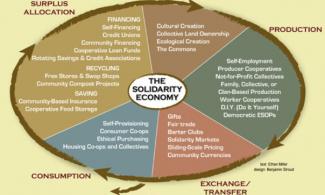Both Hands in the Soil
There is an ethical imperative to shift the balance of economic power away from corporate Capitalism and toward economies that benefit us all. Beginning with this assumption, I will explain how it is possible for unions and worker cooperatives to collaborate strategically to take market share away from absentee-owned and wage labor capitalist enterprises and place control of resources and production in the hands of communities of working people.
Both unions and cooperatives initially arose, late in the 19th century, to combat the inequities of capitalism and to foster working class independence from the disempowering conditions of wage employment. But over the century that followed, unionists and cooperators alike, with a few notable exceptions, have lost sight of their critique of capitalism and their calls for liberation from the wage relationship. The working class possesses everything we need to create wealth and social prosperity in our own interest. The hesitation, I believe, is a matter of disbelief, a collective self-doubt after decades of brutal setbacks, slander, and deliberate confusion of the issues at hand. Now is the time to make the path clear for a viable economic approach toward social justice, one that begins with the world's two oldest working class institutions, unions and cooperatives. Neither alone is in a position to take on the market domination of Capital. But through working together their collaborative potential could be economically transforming.
On one hand, the labor movement-not realizing the potential of union-co-op collaborations- resembles a gardener not understanding the relationship between tilling the earth and planting the seed. We have unions doing constant battle with capitalists, forever tilling the soil but never planting their own labor-based seeds. On the other hand, cooperatives are enterprising and constructive, but they don't cultivate the political consciousness to challenge the truncating impact of the competitive environment in which they plant. Cooperatives continually throw their seeds on hard competitive ground. The future of social justice begins with both hands in the soil, it is a weed and seed project designed to uproot the unjust power dynamics of Capitalism and replace it, enterprise by enterprise, with creatively organized cooperatives that serve the needs of people.
A Mutually Beneficial Relationship for Corporation Busting
There are numerous benefits for both unions and co-ops in developing this sort of weed and seed collaboration. Here's a brief summary of them:
What can cooperatives offer unions?
- Strategic control of unemployment levels
- An overall resulting increase in wages
- Place-based enterprises with no interest in relocation
- Democratic say in means and organization of production
- Profit-sharing
- A stable revenue stream for organizing within capitalist enterprises
- A growing worker-based economy in which to participate as consumers
- Leverage in negotiations with employers throughout industries in which cooperatives provide high road and high wage models.
What can unions offer cooperatives?
- A share in start-up risks
- Motivated work force
- Access to a large pool of worker intellectual capital
- Perspective on industry-wide trends
- Cross-company worker solidarity
- A resulting leverage with competition
- The potential to reproduce the cooperative model in abandoned facilities
Imagine, then, a worker-owner cooperative partnering with a trade union in their industry. As a part of the partnership, the trade union capitalizes the co-op in an effort to maximize competitive advantage. If jobs are created, they are filled by unemployed unionists. The unionized cooperative positions itself to maximize efficiency and increase revenue in the competitive market. The cooperative can draw not only on the intellectual capital of their own workers, but on the collective knowledge of all members of that industrial union sector. The union has the dues and support of the cooperative members in preparation for further organizing in the industry.
Because the union-cooperative has no shareholders to pay, and provided that assets are well managed, the partnership should be able to simultaneously pay workers on the high end of the wage scale and also save money to expand the enterprise. As the cooperative grows, it takes in workers, offsetting unemployment so that unionists in the given industry are able to maintain bargaining leverage. With these conditions in order, the union begins to demand co-op standard wages across the industry. If competing capitalist enterprises decide the wage market is too expensive and sell or bankrupt themselves, the union-cooperative can position itself to purchase their abandoned facilities the creative-democratic workplace strategy*.
Overcoming Barriers, Moving Our Thinking Forward
How to move forward? Part of what's needed is for the working class to overcome the barriers that prevent us from recognizing and directing our power. Many of these barriers are within us, in our own thinking and attitudes; for example:
- Lack of creativity in finding solutions to economic problems, which are the root of social problems;
- Fear of risking the few, shrinking economic securities we have;
- Individualist mindset rather than a mindset of solidarity;
- Misunderstanding about how credit and capital can work to the advantage of workers;
- Misunderstanding of all profit-making as being Capitalistic in nature.
There has never been a more crucial moment in history for employing innovative strategies of working class solidarity. I urge unions and cooperatives to reach beyond their traditional boundaries and consider this and other ideas to co-create the economic basis for a socially just world.
* Note: More on this strategy can be found in the work of Peter Davis at University of Leicester. See the Review of International Cooperation, Volume 82, No. 1, 1989.
Lisa Stolarski is a founder of Jane Street Housekeeping, a worker cooperative, and also a member of the Industrial Workers of the World. Email her.


Add new comment